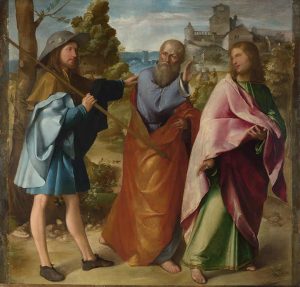HOMILY WEDNESDAY OF EASTER OCTAVE – Year I
Faith, Hope and Healing
(Acts 3:1-10; Ps 105; Lk 24: 13 -35)
*******************************************
“In the name of Jesus Christ of Nazareth, stand up and walk!”
Those dramatic words, spoken by St. Peter shortly after Pentecost, along with today’s gospel, assure us that faith in the name of Jesus brings about both hope and healing.
Turning first to the gospel, St. Luke takes up the theme of new creation so characteristic of St. John – “On the first day of the week,” which turns out to be late on the day of resurrection itself, as the two disciples later state, “The women were at the tomb early this morning.” Those disciples, discouraged and disillusioned, were on their way from Jerusalem to Emmaus which apparently was a resort town, so they had given up hope and were going back to their old way of distracted living.

Altobello Melone
The Road to Emmaus
Oil on wood, 145.5 x 144.2 cm
Bought, 1864
NG753
https://www.nationalgallery.org.uk/paintings/NG753
The fact that they did not recognize Jesus when he joined them suggests to us that we are to recognize him in everyone we meet, friend and stranger alike. The interchange with Jesus that follows resembles in a remarkable way the format of the Eucharist: penitential rite (Jesus listens to their problems), the Liturgy of the Word (Jesus explains the scriptures that were all about him), the Eucharist itself (they recognize him in the breaking of the bread) and the recessional (they turn around and return to Jerusalem, transformed and hearts burning within them) to recount to the others how they had encountered the risen Lord, who was very much alive. Their hope that had been dashed came back in full force.
They had hoped Jesus would redeem Israel. Now they are beginning to expand that hope to realize Jesus is the Messiah who came to redeem not just Israel, but all of humanity, to forgive the sins and heal the sinfulness of all those who believe in him. They learned that all the prophecies of the Old Testament that to this day remain somewhat of a mystery to devout Jews, especially those of the suffering servant of Isaiah, were all fulfilled in Jesus. Those scriptures can only be fully understood in the light of the resurrection of Jesus, and finally, in the light of the New Testament.
In the first reading, St. Peter, filled with the Holy Spirit of the Risen Lord received at the Pentecost event, and trusting completely in the power of the name of Jesus to heal, commands the lame man to stand up and walk, and he does – a miracle of healing done by the apostles in the name of Jesus.
The lesson is clear – faith in the name of Jesus can bring us both hope in a bright future and healing of our painful present. Ron Rolheiser’s article on taking our wounds to the Eucharist as the ultimate healing sacrament, capable of healing our inner wounds when nothing else works, is a wonderful reminder of that kind of faith.
The response of the people to the miracle of the lame man being healed is worded as “wonder and amazement.” That is not really faith, and we are called to go far beyond that. We are to have the faith of St. Peter, and boldly proclaim to others, “In the name of Jesus Christ of Nazareth, take up your mat, let go of your sin and sinfulness, habits and sadness, and walk into a new way of life.”
The psalm reminds us that our basic attitude before all of this, again going far beyond wonder and amazement, should be a deep and profound gratitude to God who turns everything to the good for those who love God.
The Eucharist, as we saw above, is a mini-experience of the road to Emmaus encounter, as Jesus joins us along the road of our life, listens to our pain, forgives us through his Word, nourishes us with his Body and Blood, and sends us out like those disciples, forgiven, healed and transformed, to proclaim the good news to a world not even close to wonder and amazement.



